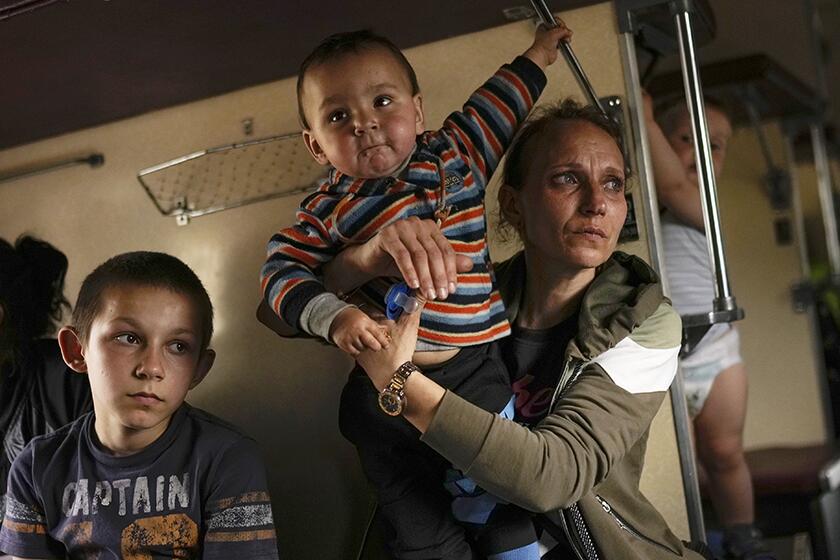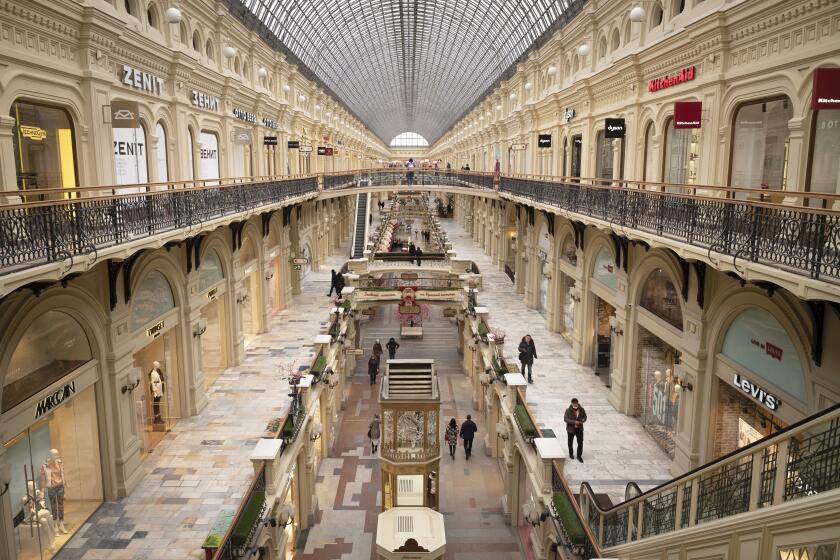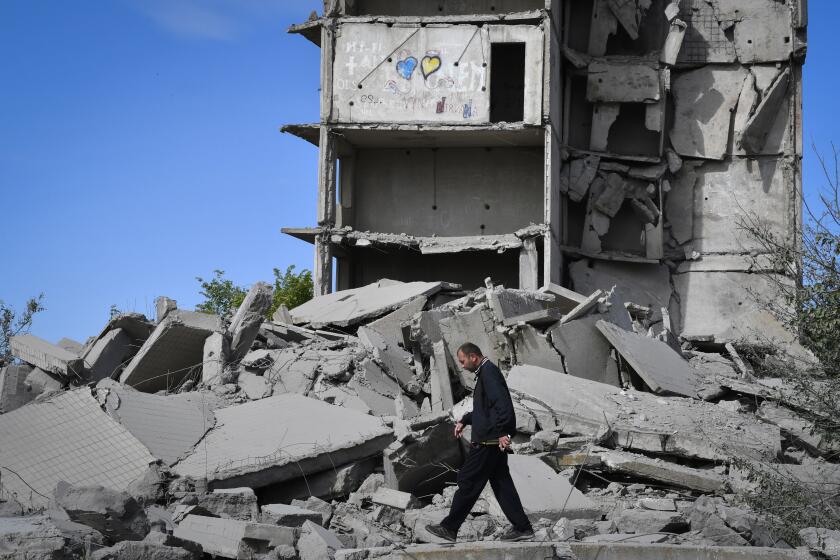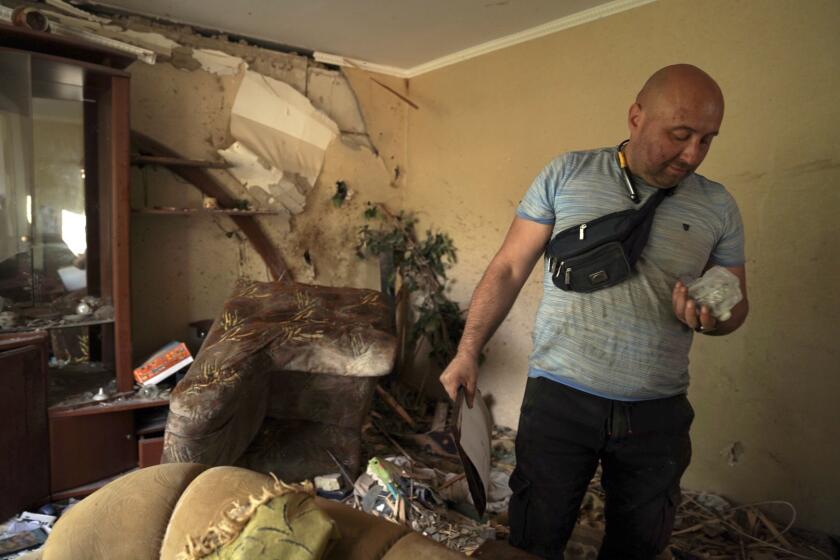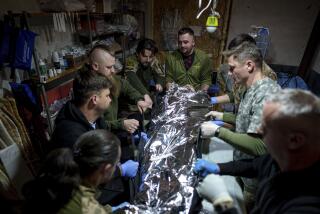Russian forces close in on takeover of eastern Ukrainian province
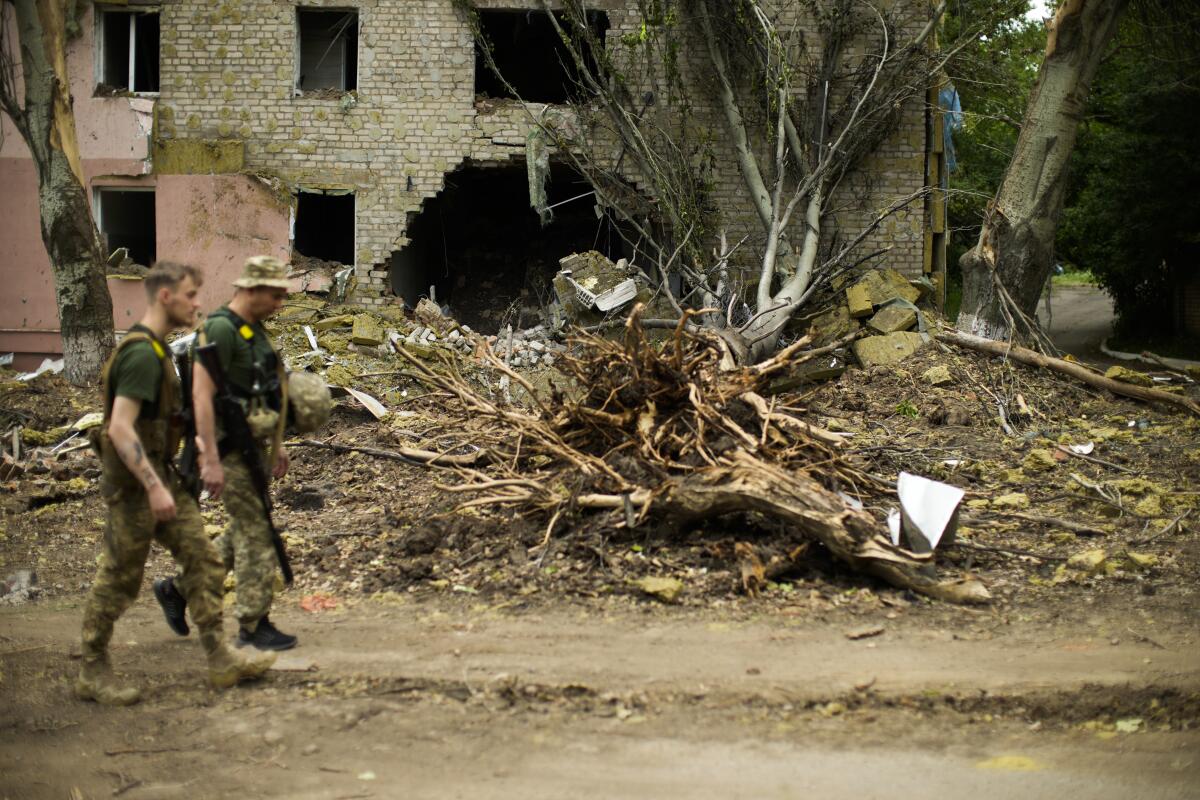
- Share via
DNIPRO, Ukraine — Ukrainian forces desperately tried to block a complete Russian takeover of one of the country’s two eastern provinces Tuesday, with Russian troops clawing out incremental gains even as European leaders agreed to a partial oil embargo aimed at starving Moscow’s mammoth war machine.
A combined force of Russian troops, Chechen fighters and pro-Moscow separatists slugged their way deeper into Severodonetsk, the Ukrainian government’s seat of power in the province of Luhansk, seizing a sizable portion of a city that has been almost completely destroyed in the fighting.
“Unfortunately, the front line divides the city in half. But the city is still defending itself, the city is still Ukrainian, our soldiers are defending it,” Mayor Oleksandr Striuk said in an interview Tuesday with a Ukrainian broadcaster. He urged residents to remain in their shelters, adding that aid stockpiles would last a few more days.
The Luhansk regional governor, Serhiy Haidai, said Russian strikes also destroyed a nitric acid factory in the city. Photographs, which could not be independently authenticated, showed huge orange clouds of thick smoke rising into the sky and were posted on Ukrainian news websites. Haidai echoed the mayor, urging people to remain in shelters to avoid the toxic air.
Farther west, Russian artillery also pounded the city of Slovyansk, the next target after Severodonetsk as Russian forces advance. Several Ukrainian residents were reported killed and wounded Tuesday after Russian rockets hit an apartment complex where only a few dozen people still lived amid the intensified fighting. Most were sleeping when the attack came.
Earlier, the Moscow-backed leader of the self-proclaimed breakaway Luhansk People’s Republic, Leonid Pasechnik, said one-third of Severodonetsk was in Russian hands, adding that his forces controlled 95% of Luhansk’s territory.
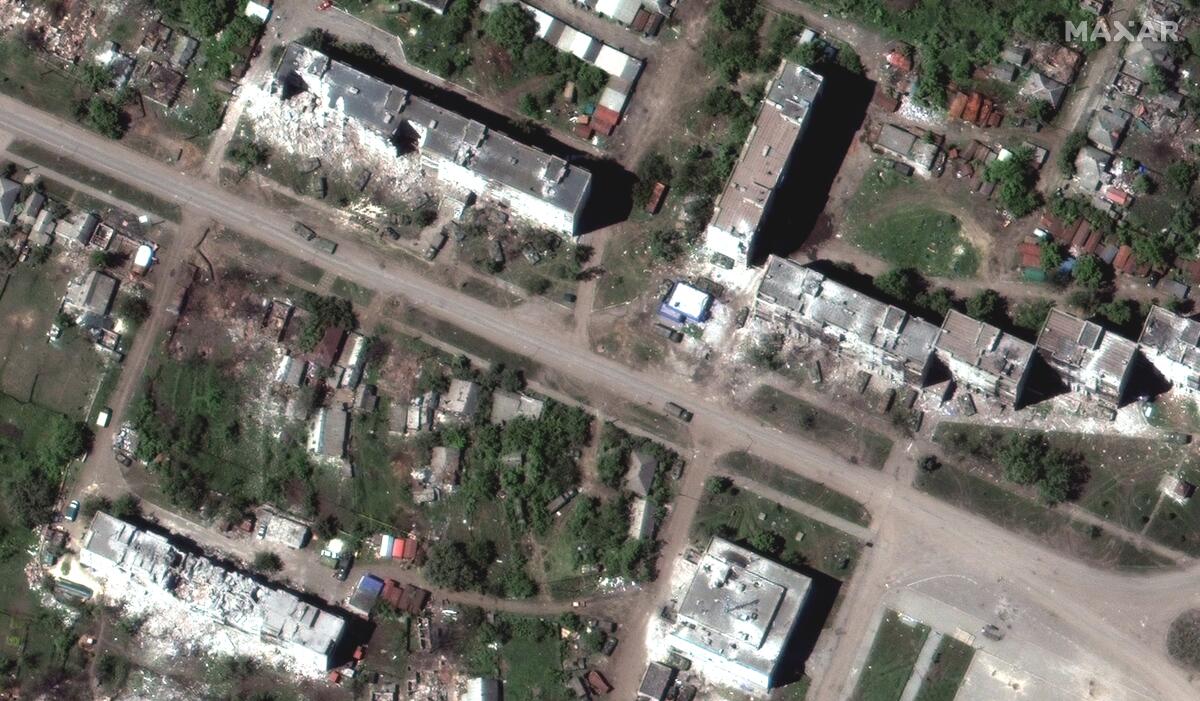
“Our offensive is proceeding perhaps not as fast as we would like,” Pasechnik said in an interview with Russian state news agency Tass. “But above all, we want to preserve the infrastructure of the city as much as possible.”
Over the weekend, Ukrainian President Volodymyr Zelensky said the Russian assault had already destroyed all of Severodonetsk’s “critical infrastructure.” Another city official last week said about 90% of residential buildings in the city were damaged.
In separate comments Tuesday, Zelensky rejected suggestions in some quarters — including from former U.S. Secretary of State Henry Kissinger — that Ukraine should be prepared to give up some territory to Russia to end the war. Ukraine’s mission was to dislodge Russian “occupiers” from all parts of the country, Zelensky said. “I don’t care what Russia’s plans are,” he said, according to the presidential office. Some Biden administration officials are privately beginning to see that goal as unrealistic.
Amid the fighting, two Russian soldiers were convicted of war crimes by a Ukrainian court, which sentenced each man to 11½ years in prison. Alexander Bobykin and Alexander Ivanov were charged with shelling civilian buildings in the Kharkiv region Feb. 24, the first day of the Russian invasion. It is the second war-crimes trial since the conflict began.
Civilians who managed to flee eastern Ukraine say intensified shelling over the past week left them unable to even venture out from bomb shelters.
As the battle for Severodonetsk intensifies, up to 12,000 civilians “remain caught in the crossfire without sufficient access to water, food, medicine or electricity,” Jan Egeland, secretary-general of the Norwegian Refugee Council aid group, said in a statement Tuesday.
“I am horrified to see Severodonetsk, the thriving city where we had our operational headquarters, become the epicenter of yet another chapter of the brutal war in Ukraine,” he said, adding that “near-constant bombardment” had left civilians with “precious few opportunities” to escape and that fighting had made aid deliveries impossible.
“We cannot save lives under the hail of grenades,” Egeland said.
In grim proof of his words, French journalist Frederic Leclerc-Imhoff, 32, was killed Monday when Russian bombardment of a road outside Severodonetsk struck a vehicle evacuating civilians from the city, Ukrainian and French officials said.
That attack pushed Ukrainian officials to halt evacuations, said Striuk, the mayor.
In his overnight address to the nation, Zelensky acknowledged the “extremely difficult” situation in the eastern region of Donbas, which comprises Luhansk and Donetsk provinces, where he said “the maximum combat power of the Russian army is now gathered.”
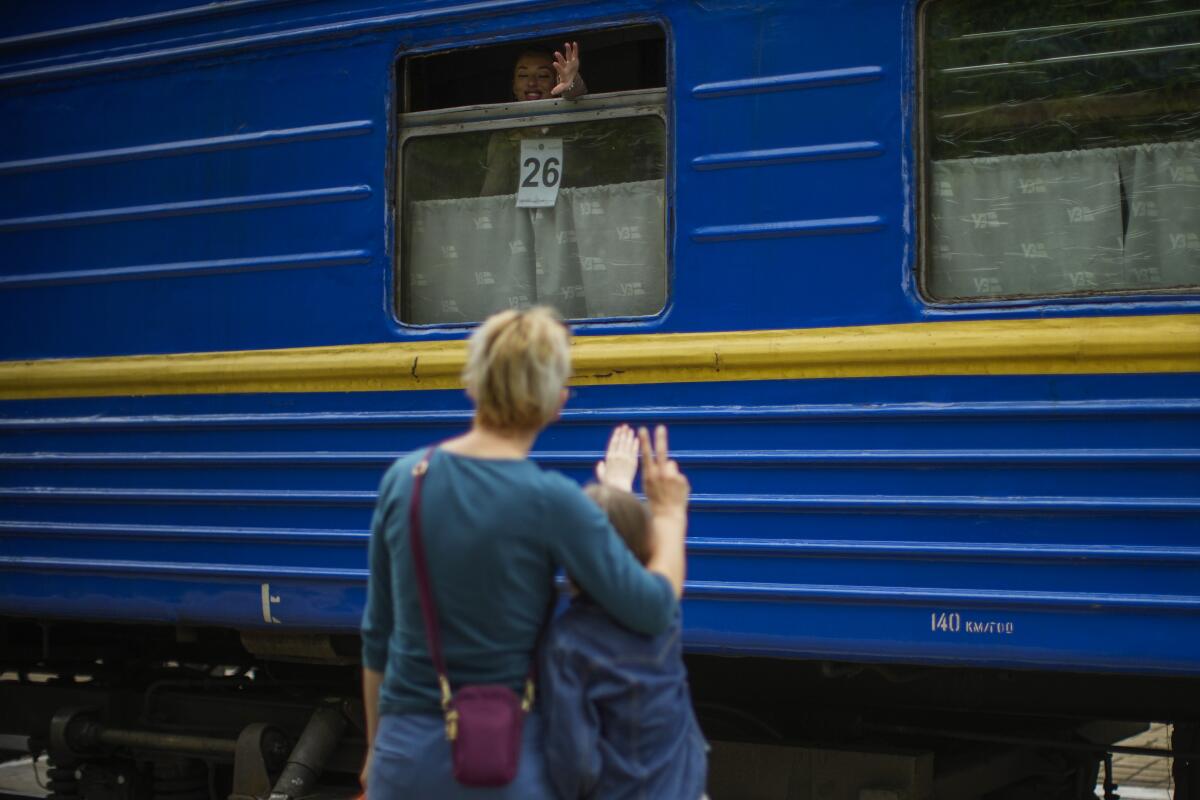
Zelensky also accused Moscow of blocking Ukraine’s Black Sea ports, preventing the export of 22 million tons of grain, a move he said could exacerbate a global food crisis.
“This is the volume that was to enter the foreign market. And Russia’s blockade of our exports is destabilizing the situation on a truly global scale,” he said.
At a news conference in Bahrain on Tuesday, Russian Foreign Minister Sergei Lavrov said that if Ukraine de-mined its coastal waters, then the Russian navy would guarantee grain-bearing ships’ passage.
“If this problem is solved ... then on the high seas, the Russian naval forces will ensure the unhindered passage of these ships to the Mediterranean Sea and farther to their destinations,” Lavrov said, adding that “everything that depends on [Russia] is guaranteed.”
Many ordinary Russians are reeling from blows to their livelihoods, emotions and prospects delivered by the international response to the Ukraine war.
The finger-pointing over food supplies comes as the European Union approved a sixth package of sanctions aimed at isolating Moscow and starving it of funds to pursue the war. The package includes an embargo on seaborne deliveries of Russian oil by year’s end, which would stop roughly two-thirds of Moscow’s exports to Europe. The required unanimous consent of all 27 EU states was hard-won, with landlocked countries, especially Hungary, successfully demanding that pipeline oil deliveries be excluded from the ban.
“Certainly we cannot prevent Russia selling their oil to someone else,” the EU’s chief diplomat, Josep Borrell, said in Brussels on Tuesday. “We’re not so powerful, but we are the most important client for Russia.”
Other sanctions include cutting off Sberbank, Russia’s largest bank, from SWIFT, the international money transfer network, along with the banning of Russian state-owned broadcasters.
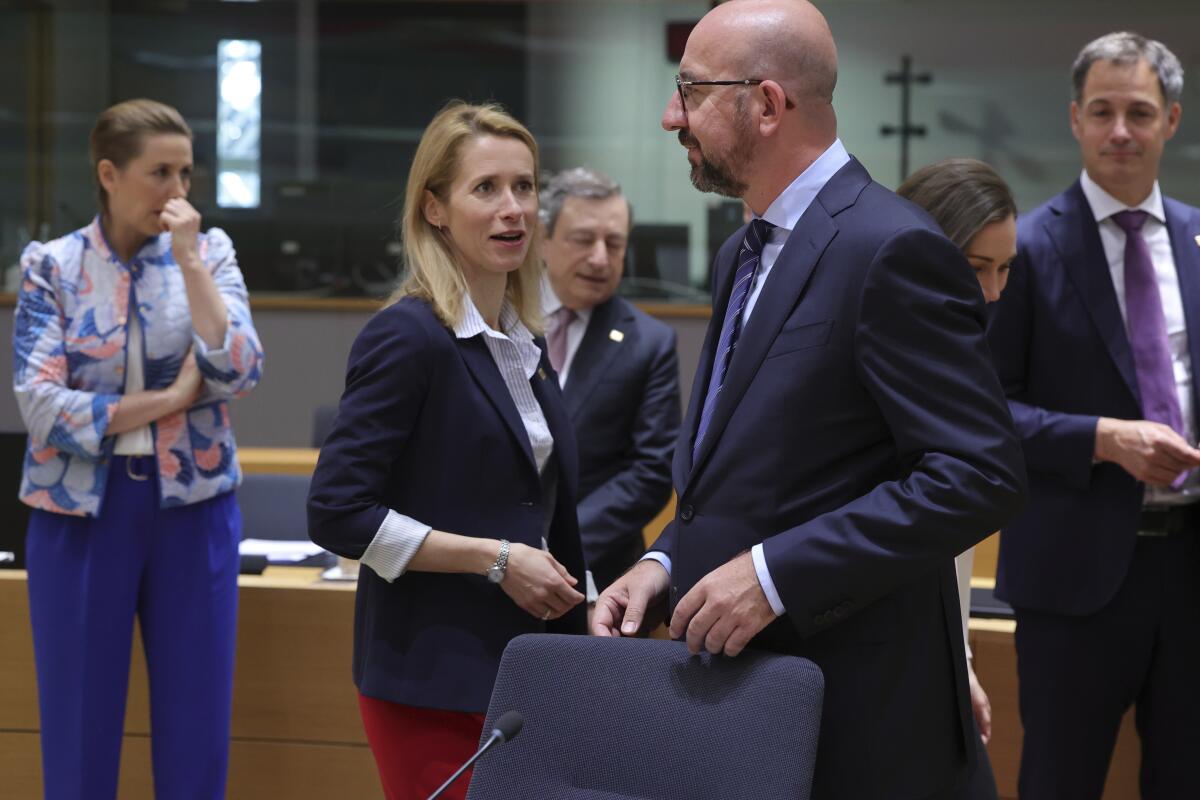
On the ground in Ukraine, Moscow is seeking to solidify its control of conquered territory. In the beleaguered city of Mariupol, the target of an all-out Russian assault that ended earlier this month when Ukrainian holdouts surrendered their positions, the Moscow-installed separatist leader of the self-proclaimed Donetsk People’s Republic said the breakaway region would have its own “merchant navy.”
Denis Pushilin said ships still in Mariupol’s port — Ukrainian or foreign — would be commandeered and re-flagged.
“Some of the ships will be transferred to the jurisdiction” of the breakaway republic, Pushilin told Tass on Tuesday. “The relevant decisions have already been made. The flags that will be on them are also already clear.”
And in the Russian-controlled Kherson region, a Moscow-appointed official said Tuesday that the area would soon become part of Russia, according to a report from the Russian RIA Novosti news agency, which said the region would be integrated into Russia’s banking system.
Ukraine is one of the world’s largest exporters of wheat, corn and sunflower oil, but the war has prevented most of those products from getting out.
Ukrainian officials fear a similar scenario playing out in the Donbas, where Kyiv’s hold is steadily slipping as its forces wait for Western weapons deliveries, including U.S. long-range rocket systems. President Biden on Monday said he would not send Ukraine any weapons with ranges that could reach targets inside Russia for fear of escalating tensions with Moscow. On Tuesday, the administration announced that it would send a small number of high-tech, medium-range rocket systems requested by Ukraine.
The rocket systems are part of a new $700-million tranche of security assistance for Ukraine from the U.S. that will include helicopters, Javelin antitank weapon systems, tactical vehicles, spare parts and more, according to two senior administration officials.
Other administration officials said Tuesday that longer-range missile systems had not been ruled out. Ukraine, in truth, already has artillery that can hit at least Russian border towns, the officials said. The weapons at the top of Ukraine’s wish list are the even more powerful “high mobility artillery rocket systems,” which the administration is debating whether to include in the more than $40-billion package of military aid it is sending Ukraine.
The large-scale evacuation of civilians from towns and villages in the Donbas increased Tuesday ahead of the offensive on Slovyansk and anticipated attacks on Kramatorsk, the two cities in Donetsk province whose capture would allow Russian troops to encircle a large portion of Ukrainian troops.
Volunteers and Ukrainian soldiers were collecting people — especially the elderly and infirm — and arranging transportation to Kramatorsk and, farther west, to the rail hub of Dnipro. Special trains were moving residents to safer zones farther west. In some cases, volunteers were hoisting evacuees who use wheelchairs into trains in the Dnipro station. Those just arriving from the east were being taken to shelters for the night.
Breaking News
Get breaking news, investigations, analysis and more signature journalism from the Los Angeles Times in your inbox.
You may occasionally receive promotional content from the Los Angeles Times.
“We’re just happy to be getting out alive — the world needs to know what’s happening here,” said Nina Shatanko, 50, of Slovyansk, who was boarding a train for central Ukraine after being evacuated along with her son, Oleksiy, 14, and mother-in-law, Elena Shatanko, 88.
The boy stared blankly at the waiting train. His grandmother, exhausted, was silent as she rested in a wheelchair at the station, awaiting the next move.
“It’s very hard on both of them, to have to give up everything and relocate,” Nina Shatanko said. “But what choice did we have? Slovyansk is terrible now — shelling all the time. No one wants to die.”
Like many other families, hers had already endured relocation in 2014, when pro-Russia forces seized a portion of the Donbas, sparking an eight-year war that killed more than 14,000 people and left the area divided before the current invasion.
It’s been almost two months since Russian forces retreated from the outskirts of Kyiv, ending plans for a quick takeover, but devastation lingers.
She said the stress had been too much for her husband, who died three years ago.
“Who would have thought this would happen again?” Shatanko asked. “And this time it’s much worse. ...
“Staying in Slovyansk now was just not possible. Maybe we can go back sometime. I just don’t know.”
McDonnell reported from Dnipro and Bulos from Beirut. Times staff writer Tracy Wilkinson contributed from Washington.
More to Read
Sign up for Essential California
The most important California stories and recommendations in your inbox every morning.
You may occasionally receive promotional content from the Los Angeles Times.
